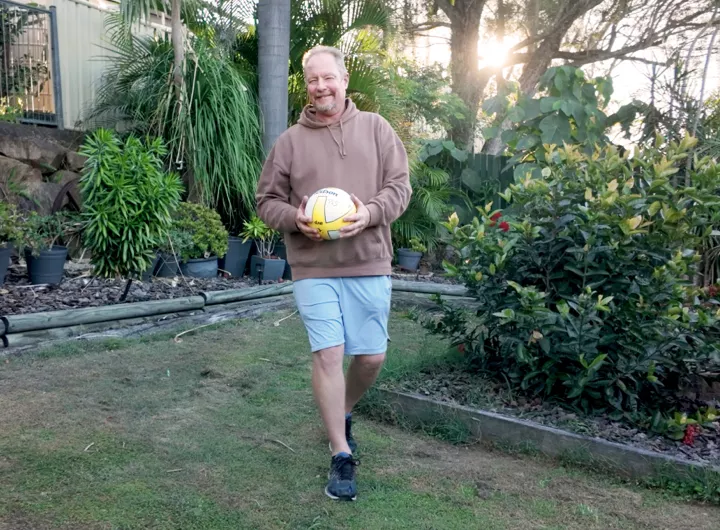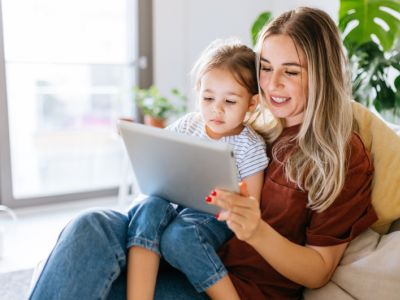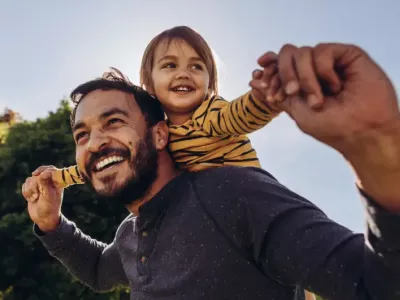Matt’s co-parenting tips: managing emotions and supporting his boys

Parenting after separation or divorce isn’t easy. You're managing your own emotions while trying to keep things steady for your kids through big life changes. When routines shift or communication gets tough, it can feel overwhelming. But with the right support and some practical co-parenting tips, it’s possible to find a new rhythm where children feel secure in both homes.
When Matt separated from his partner during the COVID-19 pandemic, he was suddenly co-parenting three teenage boys across two households, without the usual support systems in place.
“It was a really tricky time,” Matt said. “I went online, and there was a maze of information, some helpful, some not. It was hard to know where to start.”
Fortunately, Matt found Family Transitions Triple P Online, a free, evidence-based coparenting program. What started as a resource turned into a lifeline, and something that helped him focus on what mattered most: successful co-parenting for his kids.
The benefits of flexible support during co-parenting
Life as a newly solo parent is busy and can be isolating. “Being able to have a resource when I needed it, and being able to access it whenever I wanted, was a great help,” he said.
The video examples in the program helped Matt reflect on his own co-parenting choices.
“I’d watch one and go, ‘Oh hang on, I did that….’ It was relatable. It helped me reassess what I’d done and what I was doing.”
Triple P tips for managing emotions as a co-parent
Matt said one of the biggest lessons was learning not to be so hard on himself.
“You can guarantee no one’s ever got this right,” he said. “So being kind to yourself and looking after yourself, it helps you and the kids.”
He realised that when he felt overwhelmed, his children picked up on it.
“If you’re not looking after yourself and your mental health, you’re not looking after your kids. It’s very hard to find that balance, and your children will react differently.”
The strategies he learned helped him respond more calmly and make more thoughtful choices in challenging moments, building emotional regulation skills for himself and his boys.
Making co-parenting easier for children
Matt began to shift his mindset: co-parenting wasn’t just about managing things with his ex, but about supporting the boys together.
“It was a really emotional time,” Matt said. “But I had to step back, think about my own reactions, and try to see things from the other side too.”
He started thinking more about what he could control and how having clear expectations across both homes could make a difference.
Supporting children’s mental health
For Matt, it came down to communication, reflection, and putting the boys’ wellbeing first. He learned to consider different perspectives, and focus on helping the boys feel supported – no matter which home they were in.
“It made me aware of how to relate to their emotions. And they’re boys, so they’re not overly open. But having a window into what they might be thinking gave me a point of reference,” he said.
Having open conversations helped Matt and his kids develop their emotional intelligence and their regulation skills.
“I could start off a conversation with, ‘you might be feeling this way, or I’ve noticed you seem quiet’, or even talking about my own emotions. It gave me a point of reference.”
Why free and flexible support makes a difference
“When you see something free on the internet, you think, ‘Here we go, what’s the catch?’ But there wasn’t one,” Matt said. “And when you’re suddenly carrying 100% of your household’s costs, that makes a big difference.”
Being able to revisit the content made it more useful. “You’d take notes, but you could always go back to the video and go, ‘Hang on, what did I say I was going to do?’ That made it practical.”
Matt said one of the most helpful things was simply seeing himself in the videos. “You’d watch a video and think, ‘Someone’s been there before.’ Even if you’d done the ‘wrong’ thing, you could go, ‘Yeah, that was me. I get it now.’ That’s what I mean about being kind to yourself. You’re going to make mistakes.”
Matt found support in parenting in small, everyday interactions, like at his local footy club. “The willingness of other people just to talk, just to listen… they’re not judging. Just the ability for them to say, ‘If you need to catch up, give me a call’. That kind of connection really helped.”
Those moments helped him feel less alone, and more able to cope with the demands of parenting after separation.
The program reinforced that reaching out for support is part of the process. “It won’t solve all your problems, but it’s a really good starting point – or a middle point, or a finish point –depending on where you're at.”
Matt’s also encouraged his boys to talk when they need to. “I’m trying to instil that. They need to talk. Not bottle things up.”
Based on his experience, Matt would recommend Family Transitions Triple P Online to other divorced or separating families.
“Absolutely,” Matt said. “You don’t have to take all of it. There are bits that will resonate with everyone. Every transition is different, but there are elements that are relatable to everyone.”
Finding your way, one step at a time
Co-parenting after separation isn’t about getting everything right, it’s about doing what works for your family. With the right tools and support, you can feel more confident to navigate what can be an incredibly tough time in your life. Family Transitions Triple P Online is free, flexible, and ready whenever you are.

